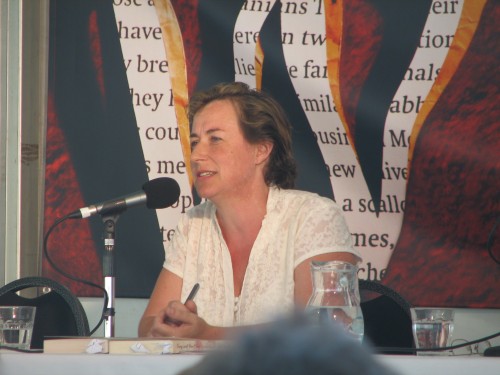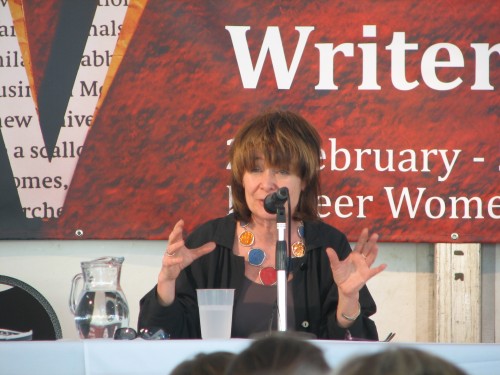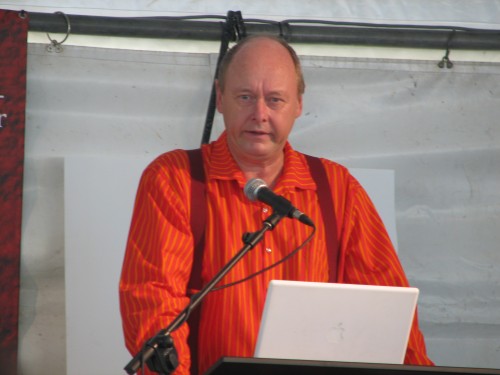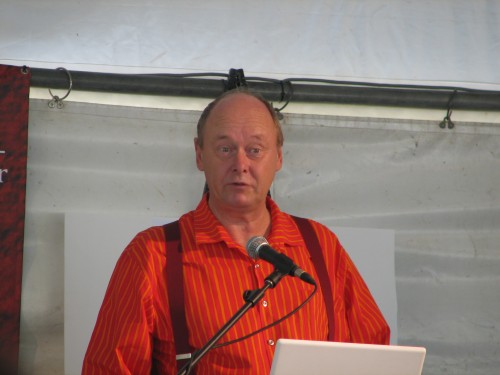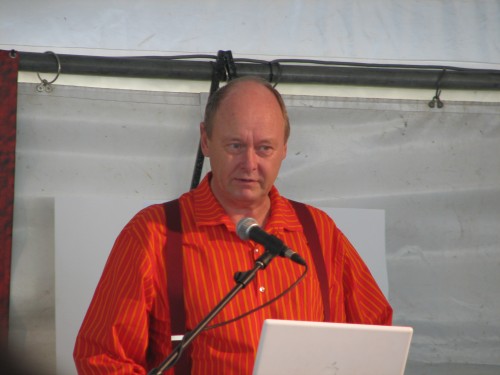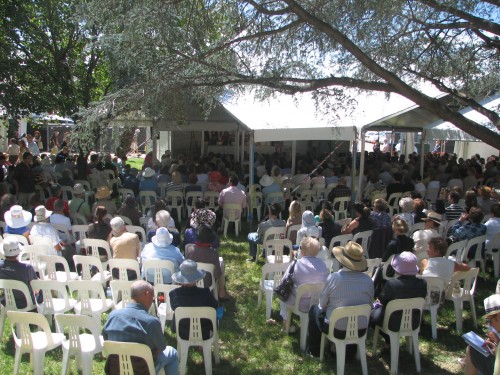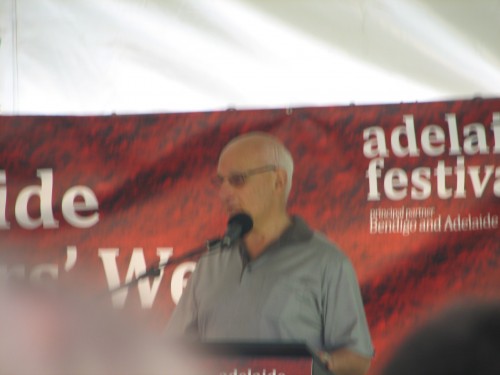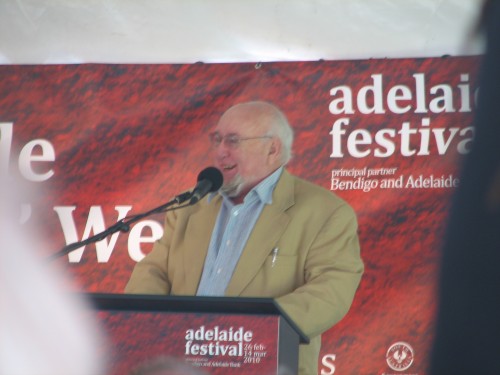Cate Kennedy at Adelaide Writers’ Week
Novelist and short story writer Cate Kennedy was one of the Australian speakers at this year’s Adelaide Writers’ Week.
Cate is a novelist, poet and short story writer who has already achieved a significant body of work, wide recognition and a number of major awards, including winning The Age short story competition on two occasions. She is the author of the novel The world beneath and the poetry collections Joyflight and Signs of other fires. She also spoke at length about the inspiration for and the experiences which contributed to her travel memoir called Sing and don’t cry: a Mexican journal. This resulted from working in Mexico for two and half years during which time her yearning for Australia set her writing in earnest. Her collection of short stories called Dark roots was short listed for several literary awards in an era when writers are told that short stories do not sell.
I found her talk very interesting, especially on the way she goes about her writing. She claims that story telling is in her blood and has been especially inherited from her grandfather who told her many stories in her formative years. One particular anecdote about him had the audience laughing. Her grandfather and a good friend – both in their 80s – worked out a mathematical formula which would enable them – at a calculated speed – to drive from one side of the Adelaide CBD to the other without having to stop at traffic lights. Somewhere their calculations went awry and they ended up crashing and in trouble with the law. It sounds dry and humourless told here, but Cate’s skill as a story teller enlivened the crowd listening to her.
She encouraged the writers present to have fun with their writing. ‘Write what you enjoy reading,’ she said. ‘Draw on your life experiences. Write the best you possibly can and you will get published.’
Good advice.
Good writing everyone.
Related articles:
- Adelaide Writers’ Week – more articles from my archives.
Sarah Dunant at the Adelaide Writers’ Week 2010
One of the great things about attending a writers week like that recently held in Adelaide during this year’s Festival of Arts is that you get to meet and hear from a wide range of writers from around Australia and from overseas.
At this festival I attended on three of the six days. I heard from a number of writers I had never heard of before, let alone read any of their works. This is exciting, for it is an excellent way of finding new writers to read and new books to pursue. The downside is that one can simply get overwhelmed by the sheer number of excellent writers out there, many of whom have published three, four, ten or even dozens of books, all of them worthy of attention.
Where to start. [Sigh]
One of the sessions I attended was a meet-the-author type presentation with UK writer Sarah Dunant (pictured above). She gave a lively, entertaining and fully engaging talk. She lives part of the year in London and the rest in a Florence apartment.
[Bigger Sigh – I can dream can’t I?]
She explained how she developed from a crime writer into one who loves writing historical fiction. Her last three books are set in Italy in the 1500s and she went to great lengths to explain how she goes about her research, some of the fascinating facts that research has discovered about that era in recent decades and the impact of an understanding of religion on her writing.
“To understand the past you must understand religion,” she said. “Five hundred years ago it was the only game in town.” Sarah Dunant at the 2010 Adelaide Writers’ Week.
Her recent books include The birth of Venus (2003), In the company of the courtesan (2006) and Sacred hearts (2009).
I must put her books near the top of my ‘must read’ list.
Good reading.
Good writing.
Nicholas Drayson at Adelaide Writers’ Week 2010

.
One of the writers I really wanted to hear at the recent Adelaide Writers’ Week was Nicholas Drayson (pictured above).
He has worked as a journalist in Australia, Kenya and the United Kingdom. He was a professional student for many years and so he has a string of degrees in an interesting array of disciplines. He has worked in the Australian National Museum and some of his works can often be categorized as nature writing.
Just over a year ago I bought a copy of his gloriously humorous book, A guide to the birds of East Africa: a novel. With a title like that I just had to read it, not realising that, despite it being a romping good yarn, it is a love story, albeit with a twist or three, not to mention some mysteries. I reviewed this book here.

Love and the platypus
Until I listened to Nicholas at Writers’ Week I hadn’t realised that he had written several other novels, including Love and the Platypus and Confessing a murder. After his intriguing and highly entertaining address – he even sang a wonderful song about the bumble bee – I raced to the Book Tent and purchased his book Love and the platypus which I then proceeded to line up for him to sign. Katharine England, book reviewer for our local daily paper “The Advertiser”, was lined up behind me. I struck up a conversation with her, telling her that on the strength of her review of A guide I went to buy it. She had also chaired the session with Nicholas.
I can’t wait to have the time to read his other books.
Further reading:
Where are the writers for children?
Adelaide Writers’ Week 2010
Last week I attended three days of the week long Adelaide Writers Week. This biennial event is an integral part of the Adelaide Festival of Arts here in South Australia, one of the leading such festivals of its kind in the world. The list of guest speakers is often a who’s who of the writing world. This time was no exception and the impressive parade of talented writers throughout the week was very inspiring. I thoroughly enjoyed the experience.
But where were the writers for children?
They were conspicuous by their almost total absence.
Almost.
Only Markus Zusak could be said to be a writer for children – a debatable point as his audience is best described as Young Adult.
Australia has an impressive number of world class writers for children. They lead the world in their chosen field. They are acknowledged around the globe for their talent and many outsell their adult counterparts. Why, then are they totally ignored festival after festival?
Is this a case of literary snobbery on the part of the organising committee? Or ignorance?
A talented panel of writers
Adelaide Writers’ Week 2010
On the first morning of this year’s Adelaide Writers’ Week I was suddenly struck by the importance of the opening session. The panel on stage was a who’s who of Australian literature. Chair of the session was novelist David Malouf. The keynote speaker was novelist and historian Tom Keneally. The chairman of the Writers’ Week Advisory committee was South African born but now Adelaide resident, novelist and Nobel Prize for Literature winner John Coetzee. And finally there was renowned poet Tom Shapcott, who received the honour of the whole week being dedicated to him. His latest book of poetry was launched soon after the opening.
What a line up of talented, prominent writers!
It was inspiring to be in the company of such eminent men of letters.
